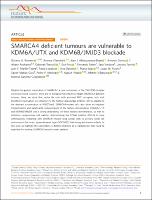Resum
Paraules clau
Teràpia del càncer
Citació recomanada
Romero OA, Vilarrubi A, Alburquerque-Bejar JJ, Gomez A, Andrades A, Trastulli D, et al. SMARCA4 deficient tumours are vulnerable to KDM6A/UTX and KDM6B/JMJD3 blockade. Nat Commun. 2021 Jul 14;12:4319.
Audiència
Professionals
Empreu aquest identificador per citar i/o enllaçar aquest document
https://hdl.handle.net/11351/6911Aquest element apareix a les col·leccions següents
- HVH - Articles científics [2972]
- VHIR - Articles científics [1201]
Els següents fitxers sobre la llicència estan associats a aquest element:

